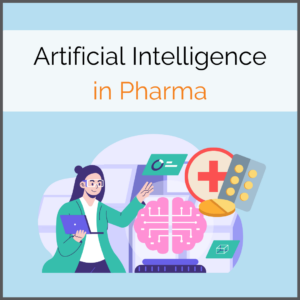
Artificial intelligence (AI) is a broad field of computer science that deals with the development of intelligent machines. These can perform tasks that usually require human intelligence, such as visual perception, speech recognition, decision-making, and language translation. AI within this context involves the development of algorithms and computer programs that enable machines to learn from data and improve their performance over time without requiring explicit human programming. Machine learning (ML), natural language processing, and robotics are methods to create AI. They often derive their “intelligence” from databases, which are also continuously growing.
AI can also be of great benefit to the pharmaceutical industry. For example, in 2020, a program called AlphaFold2 managed to predict almost all possible protein structures. These results are currently being used at the University of Toronto to develop a treatment for hepatocellular carcinoma. However, this is only one example of the potential applications of AIs. In this article, we also look at the possibilities for improving manufacturing processes, drug discovery, and the opportunities that AI may offer in the future.
Improving the manufacturing process
The use of artificial intelligence (AI) in drug manufacturing offers several benefits, including:
- Faster drug discovery: AI can help identify potential drugs faster than usual. ML algorithms can scan and analyze a wide range of gene mutation data in digital libraries. As a result, they predict which molecules are most likely to have an effect against a particular disease.
- Improved drug development: AI makes it possible to develop drugs with better efficacy and fewer side effects. Analyzing large datasets of molecular structures and their interactions with proteins can support researchers in optimizing the chemical structure of drugs and their specific effects.
- Improved quality control: Monitoring drug manufacturing processes ensures compliance with quality standards and regulations. Analyzing sensor data and real-time measurements during a production process could detect deviations and potential problems that need to be corrected.
- Increased efficiency: drug manufacturing processes are optimized, material waste is reduced and thus efficiency overall is improved. The analysis of data from multiple sources, including equipment sensors, production records, and environmental conditions, through AI, can determine the most efficient manufacturing parameters and suggest further process improvements.
Drug Discovery
It’s not just in the case of AlphaFold2 that AI can help with drug discovery. Due to the enormous amount of data, they can process in a very short time, AIs analyze many times faster than humans ever could. Artificial intelligence in the pharmaceutical industry, therefore, has three particularly suitable areas of application. The first is the prediction of molecular structures and properties. Thanks to this prediction, only molecules with the desired properties are further processed which saves time and money. Second, AIs have the potential to generate entirely new compounds. In theory, a molecule can be created that has all the properties to achieve a predefined goal. Drug research could thus become more efficient. Last, AIs can take over the workload of repetitive tasks and set free researchers’ capacities for other activities. One example would be the analysis of histological images.
Opportunities through AI
Artificial intelligence in the pharmaceutical industry has almost unimaginable potential. Known drugs could be reused or repurposed by comparing their drug target with genetic data from other diseases. By doing so, AI could maybe help to discover the effectiveness of a cancer drug as a cure for heart muscle disease. Another field of application is diagnosis. There are already AIs that detect cancer based on early symptoms. In addition, it is conceivable that skin cancer can be diagnosed more quickly in the future by combining image recognition with artificial intelligence. Machine learning can also be of use for personalized medicine. Here, the phenotypic characteristics of patients with rare reactions at the time of treatment could be identified. An AI, that helped to gain these insights, learns from the conclusions drawn by doctors to improve decision-making for future treatments. Some pharmacovigilance processes are already being operated with artificial intelligence today.
There are certainly other areas where AI in the pharmaceutical industry is helpful today, as well as those that are unknown at the time. Therefore, it remains exciting to watch the development in this field and to be surprised by the future.
[Update]
In June of 2023 the European Parliament introduced a law regulating the use of AI technology in the European Union called EU AI Act. It’s aim is to establish rules for providers and users in accordance with the AIs level of risk for humans. Additionally, the law intends the assessment of said risk beforehand. A law like this is especially relevant for the pharma industry, as artificial intelligence used in this field potentially has a significant influence, due to the implication of human health.